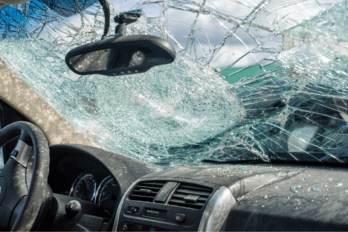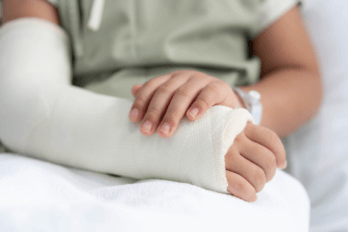
Car accidents are an unfortunately common occurrence and can result in a wide range of injuries. Many people wonder if they should go to the hospital after a car accident. While you may feel fine, some car accident injuries are not immediately noticeable.
Understanding the common types of car accident injuries can help you identify potential health issues early, seek appropriate medical attention, and advocate for yourself in any legal proceedings that may follow. Let’s delve into the 9 most common types of injuries that occur in the aftermath of a car crash.
1. Traumatic Brain Injury

Head trauma often occurs in car accidents when the driver, not prepared for the sudden impact. For example a driver strikes their head against the steering wheel, leading to potential traumatic brain injuries. Some TBI symptoms present instantly, while other injuries may not be apparent for days or weeks and can range from mild to severe. It is critical to seek expert medical help as quickly as possible so you can get a diagnosis and begin a treatment plan. This will be critical in the healing process for brain injuries.
Physical symptoms of head trauma may include:
- Headache or persistent headaches that worsen
- Dizziness and balance issues
- Loss of consciousness
- Seizures
- Weakness in extremities such as fingers and toes
- Continuous vomiting and nausea
Cognitive and behavioral symptoms of a brain injury can include:
- Memory issues
- Slurred speech
- Lack of focus
- Depressed and anxious states
- Mood fluctuations
- Agitation or combative behavior
- Coma and consciousness disorders
Additionally, a penetrating object that fractures the skull or punctures brain tissue can also result in traumatic brain injuries. These types of injuries can result in serious brain damage in vehicle crashes.
2. Concussions and Mild Head Injuries
Even a mild brain injury is serious. Symptoms that appear days later should be documented and reported to a physician, even if they seem unrelated. A doctor can determine if these post-accident issues are a result of a TBI. If you are involved in a car accident, even if your injuries appear mild at first, it is always best to seek medical treatment at the scene because some injuries may not be evident to your untrained eye.
3. Whiplash and Neck Injuries
 Whiplash and other neck injuries are common outcomes of car crashes, especially in rear-end collisions. The forceful, sudden back-and-forth motion of the head and neck, similar to the cracking of a whip, can lead to what we commonly term as ‘whiplash’. This injury primarily affects the soft tissues of the neck, including the muscles, ligaments, and tendons, causing symptoms like neck pain, stiffness, and loss of range of motion.
Whiplash and other neck injuries are common outcomes of car crashes, especially in rear-end collisions. The forceful, sudden back-and-forth motion of the head and neck, similar to the cracking of a whip, can lead to what we commonly term as ‘whiplash’. This injury primarily affects the soft tissues of the neck, including the muscles, ligaments, and tendons, causing symptoms like neck pain, stiffness, and loss of range of motion.
Severe whiplash may also result in complications like headaches, dizziness, blurred vision, and even memory problems. Due to the adrenaline rush during an accident, these symptoms might not appear immediately and could take several days to manifest. Hence, it is crucial to seek medical attention following a car accident, regardless of the immediate onset of symptoms.
3. Spinal Cord Injuries
The spine is composed of clusters of nerves that travel down the back, transmitting signals from the body to the brain. When the spine is damaged, those messages are interrupted. Seeking immediate medical attention can help in reducing the long-term effects of a spinal cord injury (SCI).
Your injuries may require surgeries and therapies. More advanced injuries may require the use of mobility devices for movement. Spinal cord injuries are classified as either complete or incomplete:
- Complete spinal cord injuries prevent the transmission of signals below the damaged area. This signal interruption leads to paralysis below the injury area.
- Incomplete spinal cord injuries leave the victim with some feeling and movement below the injury area.
Spinal cord injuries can lead to many health issues because the body can no longer properly send and receive messages up and down the spine. Bladder and bowel issues, depression, and pain management are a few complications caused by these injuries. And a person with a spinal cord injury is two to five times more likely to die a premature death directly related to the availability of timely, proper medical care at the time of the accident and the severity of the damage.
4. Back Injuries
Back injuries are caused by various types of trauma, and motor vehicle accidents are one of the leading causes. These injuries can range from minor to severe and may include damage to muscles, ligaments, tendons, discs, or vertebrae. Symptoms may include back pain, neck pain, or pain in the extremities. More serious injuries can result in nerve damage and even paralysis.
5. Internal Injuries
Internal injuries are a dangerous consequence of a car crashes, often presenting with subtle or even no immediate symptoms. These can include injuries to the lungs, heart, or major blood vessels, which can lead to serious conditions like internal bleeding, collapsed lungs, or cardiac arrest. Due to the lack of external signs, victims may underestimate the severity of their condition, making it crucial to seek immediate medical attention after a car accident. Continuous monitoring and timely intervention can significantly reduce the risks associated with internal injuries.
Organ damage can be difficult to diagnose because it is invisible without imaging.
Internal organs can suffer blunt trauma or other serious injuries that result from the force of the victim’s impact with a solid surface or object, such as a motor vehicle. Penetrating trauma results from penetration of the abdomen’s skin by an object that cuts, tears, or penetrates the organ and can potentially lead to internal bleeding due to blood vessel tears.
Car accident victims risk the potential of internal bleeding because any organ can be injured and they may not even know it.
6. Soft Tissue Injuries
Soft tissue injuries are the most common type of car accident injury, often caused by sudden movements or impact during a collision. These injuries can include bruises, sprains, strains and other damage to muscles, tendons or ligaments. Soft tissue injuries can range from mild discomfort to severe pain, and may even require surgery in some cases.
One of the most common types of soft tissue injuries is whiplash, which occurs when the head and neck are suddenly jerked forward or backward. This can result in damage to the muscles, tendons, and ligaments in the neck, causing pain, stiffness, and limited mobility.
Another common type of soft tissue injury is contusions or bruises. These occur when a part of the body collides with an object or surface, causing the blood vessels to break and leak blood into the surrounding tissues. Bruises can range from mild discoloration to more serious swelling and pain.
7. Broken Bones
Wearing a seatbelt will keep you somewhat stationary during a car accident, but your arms and legs are still vulnerable to the violent movements that occur in a crash. Arms and legs can be prone to compound fractures, crushing, and amputation in car accidents.
A compound fracture occurs when a broken bone pierces through the skin. Surgery is required to readjust the broken bone, and then it must be immobilized.
When the arms or legs become trapped between two heavy objects, crushing injuries can occur, resulting in compartment syndrome, which leads to traumatic injury to the blood vessels, muscles, nerves, and tissue. The extensive force of the crushing objects can cause amputation in worst-case scenarios.
Broken Ribs
Broken ribs are another common injury in car crashes, resulting from the forceful impact against the seatbelt or steering wheel, which can cause immense pain and might even lead to further complications like a punctured lung if not treated promptly.
8. Penetrating Injuries
Penetrating injuries are another serious type of car crash injuries that occur when an object penetrates the skin, causing deep wounds. These injuries are typically caused by shattered glass or metal fragments from the vehicle during the collision. In severe cases, these wounds can reach vital organs, posing a significant health risk and can lead to fatalities.
The severity of penetrating injuries can vary considerably, depending on the force of the impact and the nature of the object causing the injury. For example, a high-speed collision could cause a sharp fragment to penetrate deep into the body, potentially reaching vital organs and causing serious internal damage. In contrast, a low-speed collision might result in a surface-level cut or puncture wound.
9. Post-Traumatic Stress Disorder
One of the most difficult injuries to treat after a car accident is the psychological devastation that lingers long after a crash. A major contributing factor in developing PTSD after an accident is the victim’s perception and response to the accident. Stress disorders, like physical disorders, should be diagnosed and treated promptly so that recovery is possible.
SYMPTOMS OF PTSD
- Avoiding talking about the event and averting activities, places, and people that serve as reminders of the accident
- Recurrent or intrusive memories and nightmares, and disturbing dreams
- Feelings of hopelessness and personal despair, and negative feelings about others
- Lack of enjoyment in life
- Destructive behaviors
- Intense guilt and shame
- Suicidal thoughts
Car accident victims may struggle to get their lives back after a wreck. PTSD symptoms can and often do disrupt the victim’s daily life, job, personal relationships, and family. Treatment from a doctor or mental health professional can be ongoing and may require psychotherapy and prescription medication.
Involved in a Houston Auto Accident? Contact Us to Get Legal Help For Your Car Accident Injuries Today
 Being in a car collision can be overwhelming, especially when dealing with severe injuries and psychological distress. Remember, it’s crucial to seek immediate medical attention after an accident, even if you feel fine. Symptoms may not surface immediately, but early detection of common car accident injuries can significantly improve your recovery process.
Being in a car collision can be overwhelming, especially when dealing with severe injuries and psychological distress. Remember, it’s crucial to seek immediate medical attention after an accident, even if you feel fine. Symptoms may not surface immediately, but early detection of common car accident injuries can significantly improve your recovery process.
If you or a loved one have been in a car accident and are facing car crash injuries, contact our Houston car accident lawyers. Our car accident attorneys can guide you in understanding your rights and ensuring you receive necessary compensation for your medical expenses. Our personal injury lawyers offer free case evaluations. Set up your free consultation today.

